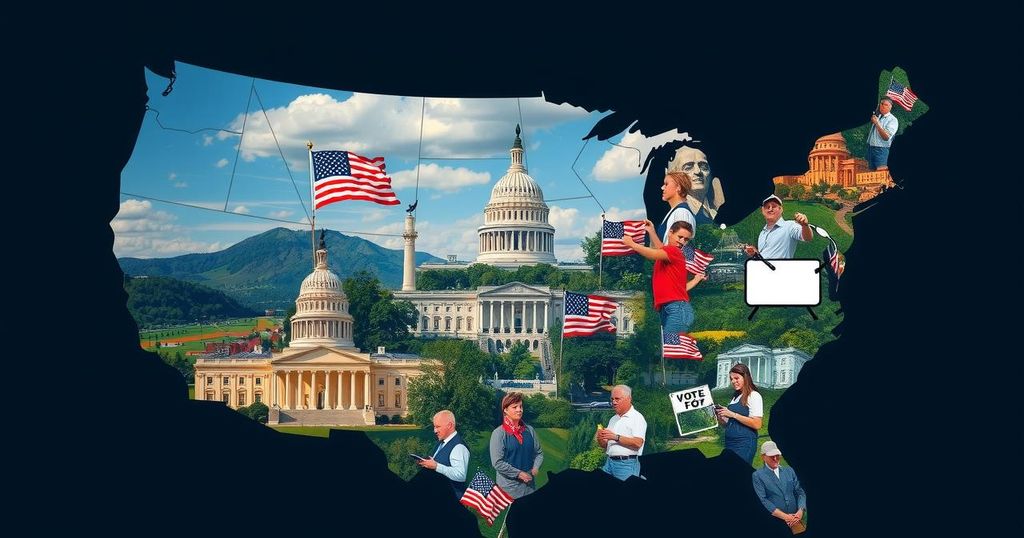Election 2024: Analyzing the Anti-Incumbent Sentiment in the United States

The upcoming 2024 U.S. presidential election poses critical questions regarding incumbency as global patterns indicate widespread electoral dissatisfaction. Despite favorable economic indicators, public sentiment remains largely negative, complicating the candidacy of Vice President Kamala Harris against Donald Trump. The election could result in unpredictable outcomes, with possible recounts and legal challenges anticipated. As early voting surpasses previous levels, concerns arise regarding foreign interference and election integrity, adding further complexity to the electoral process.
The year 2024 has thus far presented significant challenges for incumbents around the globe, resulting in notable electoral defeats. In the United Kingdom, voters dismissed the ruling Conservative Party, while South Africa’s African National Congress lost its parliamentary majority. Japan’s Liberal Democratic Party also faced setbacks, alongside the surprising outcomes of France’s parliamentary elections and Germany’s recent state elections. Given this global trend, a pertinent question arises: will the United States follow suit in ousting incumbents? Kamala Harris, the current Vice President, appears positioned to counteract this trend initially, as the U.S. economy seems robust compared to the struggles noted in other countries. Recent reports indicate a GDP growth of 2.8% in the third quarter, low unemployment rates, a thriving stock market, and decreasing inflation—elements that historically favor incumbents. Despite these positive economic indicators, public sentiment paints a different picture. Significant majorities of Americans express discontent with the state of the economy and the direction of the country, casting doubt on Harris’s chances in the upcoming election against Donald Trump. As the election nears, Republicans anticipate that the tight race could favor Trump, who seeks to become the first president since Grover Cleveland to secure non-consecutive terms, citing past polling underestimations of his support. Democrats, on the other hand, are wary of repeating earlier polling errors from 2016 and 2020, yet they maintain hopeful comparisons to the polling dynamics of the 2022 midterms, which unexpectedly favored Democrats. Current polls exhibit substantial margins of error, indicating that tight races in battleground states could yield unpredictable outcomes. The significant possibility of recounts and legal challenges looms should the elections result in close margins. As of the article’s release, approximately 68 million Americans have cast early ballots, amounting to nearly 43% of the total turnout from the previous election. However, the impact of these early votes remains undetermined due to variable demographic factors. Furthermore, the Supreme Court’s recent ruling permitting Virginia to purge dubious non-citizen registrations from the voter rolls has sparked controversy and concern, particularly with potential foreign interference through cyberattacks and misinformation campaigns shaping voter perceptions. Both candidates have delivered their closing arguments: Vice President Harris critiqued Trump for his alleged vendetta-driven ambitions, while Trump highlighted a vision for a revitalized America. Notably, the candidates refrained from emphasizing foreign policy, despite the far-reaching implications of their contrasting strategies for U.S. engagement worldwide. Finally, polling reflects divided confidence about the election’s integrity, with a majority of Democrats expressing optimism about the election’s execution as compared to Republicans. This disparity establishes a potential foundation for further political contention regardless of the election’s outcome.
The 2024 U.S. presidential election occurs amidst a global trend wherein incumbents face significant electoral challenges. Countries such as the United Kingdom, Japan, South Africa, and members of the European Union have recently experienced substantial shifts in political leadership, prompting speculation regarding the possibility of similar outcomes in the United States. The economic context also plays a critical role as public sentiment increasingly diverges from official statistics, complicating the electoral landscape for incumbents.
In conclusion, the electoral dynamics of 2024 present a complex interplay between incumbency challenges and public perception in the United States. While economic indicators might typically benefit the incumbent party, prevailing sentiments suggest that dissatisfaction could lead to a significant electoral shift. The final results remain uncertain as both candidates prepare for a closely watched finish that will resonate beyond the U.S. borders.
Original Source: www.cfr.org







